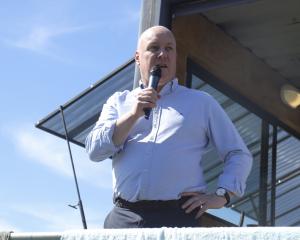
If Boris Johnson is mishandling the pandemic, he is not alone.
Falsely claiming everything is under control, dodging responsibility, hiding from public view, exploiting the crisis for political gain, mounting artificial distractions and blaming the media: these are common behaviour patterns exhibited by some of the world’s most powerful — and shifty — leaders.
Will they pay a price for their lethal incompetence and cynicism?
It’s possible some will, though it may take a while. The pandemic is changing political calculations around the globe. Leaders who looked invulnerable suddenly appear less so. That in turn could shift the strategic calculus and alter the balance of power between countries in ways both unexpected and permanent.

It seems a desperate Trump will stop at nothing to reboot his re-election prospects. If that means fomenting a cold war with China, or stoking racial divisions and anti-migrant, anti-Muslim bias, he’s up for it. And if all that fails, he may try to delay November’s election, a scenario not ruled out by his sycophantic son-in-law.
Coronavirus has made a sort of leper of Trump. A lack of federal leadership and his support for prematurely ending state lockdowns he never truly supported appears to be propelling a rise in Covid-19 cases in small Midwest towns and rural communities, from Iowa to Texas. These are the heartlands of Trump’s America, where his most loyal voters live. As a result, Republicans running for Congress are running away from Trump, fearful of infection from the miasma of lies and distrust enveloping the White House. As jobs disappear by the tens of millions, Democrats’ hopes of winning the Senate are rising.
Vladimir Putin is another leader in serious viral difficulty. Only months ago, he looked invincible. All the talk in Russia was of constitutional ‘‘reforms’’ that would effectively make him president for life. Those plans are now on hold, perhaps permanently. Putin’s decision to shield himself from harm, isolating away from Moscow, has badly dented his image as fearless tough-guy leader.
After weeks of complacency at the top, Russia finds itself with the second-fastest rate of Covid-19 infections in the world. Putin’s hand-picked prime minister, Mikhail Mishustin, is in hospital, as is Kremlin spokesman Dmitry Peskov. In video conferences held to discuss the crisis, Putin has looked more bored than concerned. Empathy was never his strong suit.
The political implications are potentially far-ranging. Anxious to avoid personal blame for twin health and economic disasters, Putin has shifted responsibility for managing the crisis to the regions, which have effectively been left to fend for themselves.
Other politicians are showing a degree of reckless insouciance that makes Johnson look positively switched on by comparison. Brazil’s president Jair Bolsonaro hit a new low for irresponsibility by ridiculing public protection measures. Brazil has the highest Covid death rate in Latin America and the third-highest number of confirmed infections in the world. But Bolsonaro prefers barbecue parties to hospital visits. He may yet pay with his job in a country where presidential impeachment actually works.
In Turkey, meanwhile, the virus has brought a great many pigeons home to roost. A structurally fragile economy, a hollowed-out civil society and media, and a climate of fear created by Recep Tayyip Erdogan have not proved conducive to a unified national effort — leading analysts to suggest the sultan-president’s reign may be drawing to a close.
Majority Kurdish areas in eastern Turkey, for example, the scene of frequent conflict with the central government, have reportedly been hard hit. Diyarbakir-based activist and author Nurcan Baysal tells a familiar tale of health workers afraid to go to work due to a lack of protective equipment. But it’s a political problem, too.
A central actor in this global drama, China’s modern-day emperor Xi Jinping, is not about to fall — although he richly deserves the sack. Rather, an emboldened Xi risks over-playing his hand as he seeks to transform a calamity into a PR victory for Chinese soft power, strengthening Beijing’s clout at the expense of weakened Western countries. American fumbling, plus Russian and European debility, offer Xi a macabre opportunity to advance his vision of China as dominant global power. But the aggressive, Boxer Rebellion-style provocations of his ‘‘wolf warrior’’ diplomats and party cadres are feeding an international backlash.
Pressure is growing to retaliate by quarantining Beijing, politically and economically. And that, in turn, boosts Trump’s confrontational, self-exculpatory campaign narrative.
Trump claims China wants to deny him a second term. Yet the opposite may be true. Xi knows a useful idiot when he sees one — and this United States president is easily outfoxed. The thought that China’s oppositional tactics could help get Trump re-elected is enough to make anyone sick. — Guardian News










